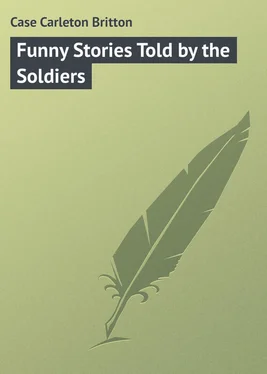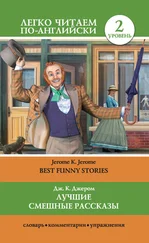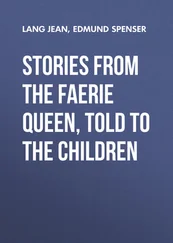Carleton Case - Funny Stories Told by the Soldiers
Здесь есть возможность читать онлайн «Carleton Case - Funny Stories Told by the Soldiers» — ознакомительный отрывок электронной книги совершенно бесплатно, а после прочтения отрывка купить полную версию. В некоторых случаях можно слушать аудио, скачать через торрент в формате fb2 и присутствует краткое содержание. ISBN: , Жанр: foreign_prose, foreign_humor, на английском языке. Описание произведения, (предисловие) а так же отзывы посетителей доступны на портале библиотеки ЛибКат.
- Название:Funny Stories Told by the Soldiers
- Автор:
- Жанр:
- Год:неизвестен
- ISBN:http://www.gutenberg.org/ebooks/48168
- Рейтинг книги:5 / 5. Голосов: 1
-
Избранное:Добавить в избранное
- Отзывы:
-
Ваша оценка:
- 100
- 1
- 2
- 3
- 4
- 5
Funny Stories Told by the Soldiers: краткое содержание, описание и аннотация
Предлагаем к чтению аннотацию, описание, краткое содержание или предисловие (зависит от того, что написал сам автор книги «Funny Stories Told by the Soldiers»). Если вы не нашли необходимую информацию о книге — напишите в комментариях, мы постараемся отыскать её.
Funny Stories Told by the Soldiers — читать онлайн ознакомительный отрывок
Ниже представлен текст книги, разбитый по страницам. Система сохранения места последней прочитанной страницы, позволяет с удобством читать онлайн бесплатно книгу «Funny Stories Told by the Soldiers», без необходимости каждый раз заново искать на чём Вы остановились. Поставьте закладку, и сможете в любой момент перейти на страницу, на которой закончили чтение.
Интервал:
Закладка:
“Salute me only with thy fist,
And don’t attempt to buss me;
The very thought of being kissed
Is quite enough to fuss me.
If you must kiss, try it on Gompers —
He hasn’t been kissed since he wore rompers.”
HAD THE RIGHT DOPE
The more things the draft officials do to baseball here the better it flourishes in London, according to Richard Hatteras, of that thriving community, who was recently in New York. Mr. Hatteras says the game is getting a firm hold on every nationality in the British capital.
“Why, recently,” quoth he, “I saw a game in which East Indians were playing. One of these approached the plate at a crucial moment and cried aloud:
“‘Allah, give thou me strength to make a hit.’
“He struck out.
“The next man up was an Irishman. He spat on the plate, made faces at the pitcher, and yelled:
“‘You know me, Al!’ He made a home-run.”
TELL THIS NOT IN BOSTON
An American boy had his first experience in the first line of trenches under fire, and an American woman met him.
“Well, boy,” asked the woman, “what was it like? Pretty awful experience, wasn’t it?”
“Awful?” grinned the Sammee. “Funniest thing you ever saw.”
“Funny?” echoed the woman, amazed. “Why, what in the world do you mean?”
“Those beans! Why – ” and he went off into a gale of laughter. “Of course you don’t know. But cook had made an enormous pot of beans for the boys and, say, they did smell some good. But they were too hot and so cook put them on the edge of the trench to cool off. Just then the Germans let go some shells and one hit that pot square. And it didn’t do anything to those beans. Honestly, ma’am, it simply rained beans for an hour!”
THE MESSAGE WAS SOBER, ANYHOW
General Sir Henry Rawlinson, Sir Douglas Haig’s “right-hand man,” is rather fond of relating a story concerning a major who, sent to inspect an outlying fort, found the commander intoxicated. He immediately locked him up; but the bibulous one managed to escape, and, making his way to the nearest telegraph office, dispatched the following message to no less a personage than the colonial secretary: “Man here, named – , questions my sobriety. Wire to avert bloodshed.”
HE HADN’T FINISHED
They had brought him in very carefully, the husky but femininely gentle stretcher bearers, for he was nothing but a kid after all, with a complexion like a girl’s and with pathetically pleading eyes. He was crying in his hospital bed when the correspondent came across him and stopped to investigate.
“Are you in great pain?” the newspaper man sympathetically asked.
The lad looked into the other’s eyes and nodded with a choking sob.
“Where does it hurt?” the correspondent pursued.
“It ain’t that,” was the reply; “it’s because they yanked me out of the scrap when I still had ten rounds left.”
THE OOZING OF THE COONS
Negro Sergeant – “When I say ‘’Bout face!’ you place de toe of yo’ right foot six inches to de reah of de heel of yo’ left foot and jus’ ooze aroun’.”
SHE WAS IN UNIFORM
First Officer (in spasm of jealousy) – “Who’s the knock-kneed chap with your sister, old man?”
Second Officer – “My other sister.”
NO CHALLENGING OUT OF HIS CLASS
Sergeant (surprising sentry) – “Why didn’t you challenge that man who just passed?”
Newest Recruit – “Why, that’s Kayo Hogan, sergeant, and he’s got all o’ ten pounds on me!”
CALLING HIM SISSY?
The Fag – “Oh, I’d go to the war quick enough, but mother wouldn’t like me to; and I’ve never disappointed her since the day I was born.”
The Snag – “Well, if she was hoping for a daughter, I’m sure you’ve done your best to console her.”
HOW DISAPPOINTED HE’LL BE
Scotch Warrior from Palestine (whose baby is about to be christened, and who has a bottle of Jordan water for the purpose) – “Eh, by the way, meenister, I ha’e brocht this bottle – ”
Minister – “No’ the noo, laddie! After the ceremony I’ll be verra pleased!”
AMERICAN HUMOR IN FRANCE
The sense of humor of the American is a joy to the French, who miss this quality sadly in the English. A young French woman was conducting two young American officers around Versailles. When they got in the park the French girl said: “Do you know that the French have a pretty saying, ‘The smaller the ivy leaf, the dearer the love?’ So I want each one of you to find the tiniest leaf possible and send it to the one that’s waiting at home.” The men set out, and the first man came back with a perfectly enormous leaf, which he told the girl he had plucked for his mother-in-law! The second officer came back with a leaf even larger and, when asked what loved one was to have that tiny leaf, he said: “Why, this is for the Kaiser!”
SNOBBERY SQUELCHED
On seeing the haughty aristocrat about to disturb a seriously wounded soldier, the Red Cross nurse in charge interposed.
“Excuse me, madam,” she said, “but – ”
She was rudely interrupted by Lady Snobleigh, who cried:
“Woman, you forget yourself. I’m very particular to whom I speak.”
“Oh,” quietly answered the nurse, “that is where we differ. I’m not!”
BLASTED HOPES
“Where is the new recruit?”
“Well, sir, since he went, an hour or two ago, to sew on a button with guncotton, no one seems to have seen anything of him.”
PROFITABLE AUTHORSHIP
The Girl – “And can you manage on your army pay, Phil?”
The “Sub” – “Hardly; but I do a bit of writing besides.”
The Girl – “What kind of writing?”
The “Sub” – “Oh, letters to the guv’nor!”
THE “LONG, LONG TRAIL” OVER THERE
Paris, Nov., 1918. – In the logging camps and sawmills, in barracks and on the drill grounds, in camps and on the march, in “Y” and Red Cross huts, at all hours of the day and night, wherever in France the Yank crusaders were at work, I have heard these lines sung, hummed, and whistled:
“There’s a long, long trail a-winding
Into the land of my dreams,
Where the nightingales are singing
And a white moon beams.
There’s a long, long night of waiting
Until my dreams all come true,
Till the day when I’ll be going down
That long, long trail with you.”
Wherever a piano found its way into the American lines someone was sure to be playing this chorus; and, dodging in and out of a convoy along the rutted and winding hillside roads in the zone of operations, in drizzle and mud and low flung clouds, one was certain to hear some camion load of lusty doughboys going to the “Long Trail.”
But it remained for H. A. Rodeheaver, Billy Sunday’s trombone expert, to put a new touch to it. He put the “longing” into the long trail with a dash of Sundayesqueness that smeared sawdust all over the long trail.
“Rodey,” as the soldiers call him, has been singing his way through the American camps in France and emulating his picturesque master, when opportunity afforded, by laying down a metaphorical “sawdust trail” and inviting the boys to hit it again in their hearts.
It was quite remarkable how many hands went up in every camp and barracks and hut when he asked them how many had attended a Sunday revival back home. Then he started singing the songs they heard at these meetings, usually beginning with “Brighten the Corner Where You Are.”
Читать дальшеИнтервал:
Закладка:
Похожие книги на «Funny Stories Told by the Soldiers»
Представляем Вашему вниманию похожие книги на «Funny Stories Told by the Soldiers» списком для выбора. Мы отобрали схожую по названию и смыслу литературу в надежде предоставить читателям больше вариантов отыскать новые, интересные, ещё непрочитанные произведения.
Обсуждение, отзывы о книге «Funny Stories Told by the Soldiers» и просто собственные мнения читателей. Оставьте ваши комментарии, напишите, что Вы думаете о произведении, его смысле или главных героях. Укажите что конкретно понравилось, а что нет, и почему Вы так считаете.

![Марк Твен - Смешные рассказы [The Funny Stories]](/books/29189/mark-tven-smeshnye-rasskazy-the-funny-stories-thumb.webp)










